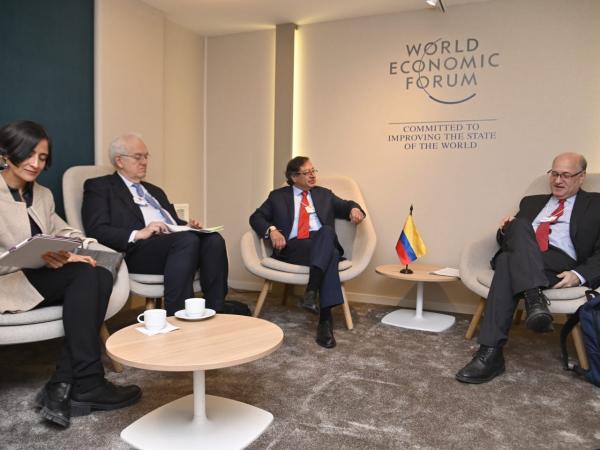The recent edition of the World Economic Forum (WEF) held in Davos occupied the cameras and the main covers of the media throughout the world.
(Read: ‘Decarbonized capitalism’: Petro’s final proposal in Davos).
Its central theme, ‘Cooperation in a fragmented world’, came to the meeting under the umbrella from which the lGlobal leaders discussed the future of the planet in the midst of the accumulation of macroeconomic, geopolitical and climatic crises.
Colombia was one of the few Latin American countries that was present at the recent edition of the forum. Led by President Gustavo Petro, Colombia presented the ‘Decarbonised Capitalism’ initiativewhich seeks to propose a new scenario for the macroeconomic development of the future, highlighting the potential of clean energy and ruling out the development of the fossil economy, one that supports the development of industry such as oil, gas and coal.
Petro summarized his interventions throughout the week in a statement lasting just over 15 minutes. “Davos entrepreneurs must think of another capitalism as their last chance: “Decarbonized Capitalism”.””, Petro pointed out, after reviewing that the current climate crisis could extinguish life on the planet.
Petro, at the World Economic Forum.
EFE
Thus, for President Petro, under his proposal it would have to “rebuild the planning power of nations articulated to a multilateral and global planning of the transition”.
(See: The government agreement with a multinational to promote youth employment).
This means, according to the Colombian president, that the decisions made in COP climate summits have binding power.
“If the World Trade Organization or any free trade agreement is binding, why aren’t decisions on correcting the climate crisis? Why are they just suggestions in the midst of the catastrophe?”, he questioned.
In line with this, he maintained, this new capitalist regime would have to make the treaties of organizations such as the WTO or the IMFare subject to climate pacts.
“Decarbonised capitalism” would have to achieve that the climate agreement seeks bluntly to reduce the consumption of coal, oil and gas until it reaches zero emissions in the short term”, reinforced the head of state.
On this point, he later added that this scheme “cannot further protect the fossil economy”, which “must enter a serious and definitive stage of devaluation”.
About the idea of debt swap for climate actionthe president pointed out that this has to be a mandate of the new capitalist regime, “in such a way that nations can finance the costs of adaptation and, above all, those of mitigation through the reduction of their debt.”
He also asked that “decarbonized capitalism” has to devalue the debt that weighs globally on production processes and on nations.
(In addition: Government insists on debt swap proposal for climate).
“Is “Decarbonised Capitalism” possible? The great transformation of capital, as Polanyi said, is now or there will not be decarbonized capitalism, not even capitalism, and it is possible that there will not be humanity.concluded the head of state.
The rest of participation

Environment Minister, Susana Muhamad, at the World Economic Forum
Twitter @MinAmbienteCo
The Colombian delegation was also made up of a ministerial leadership, including the Minister of the Environment, Susana Muhamad, and the Minister of Energy, Irene Vélez.
Muhamad, among his speeches, highlighted the proposal for debt swap for climate action that allow “financing adaptation, mitigation, as well as attention to losses and damages caused by the effects of the climate crisis.”
For her part, the Minister of Energy, Irene Vélez, raised the controversy by stating that the country will no longer award oil and gas exploration contracts.
According to the head of that portfolio, although this decision “has been controversial”, it represents a commitment in the fight against climate change, since it is an urgent decision to make the transition.
(Keep reading: Trade, between the climate crisis and the slowdown).
In order to promote greater integration between the countries of Latin America, Felipe Bayón, president of Ecopetrol, mentioned that in the energy transition “sovereignty is very important.” He was convinced that “Giving access to energy is a way to close the gaps.”
‘A lot of stress in the region’
This was stated by José Manuel Salazar-Xirinachs, executive secretary of the Economic Commission for Latin America and the Caribbean (Cepal), pointing out the impact that inflation will have on the region in 2023, the debt problem or climate change.
“If we make the list of shocks, all have hit Latin America very hard”, 4 assured. “It’s going to be a very stressful year,” said the manager, quoted by the AFP agency.
On the other hand, Marina Silva, the Brazilian Minister of the Environment, went to the forum to defend the project of President Lula, after the years of the far-right Bolsonaro.
BRIEFCASE















